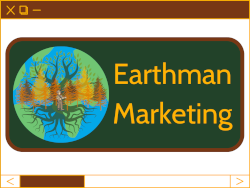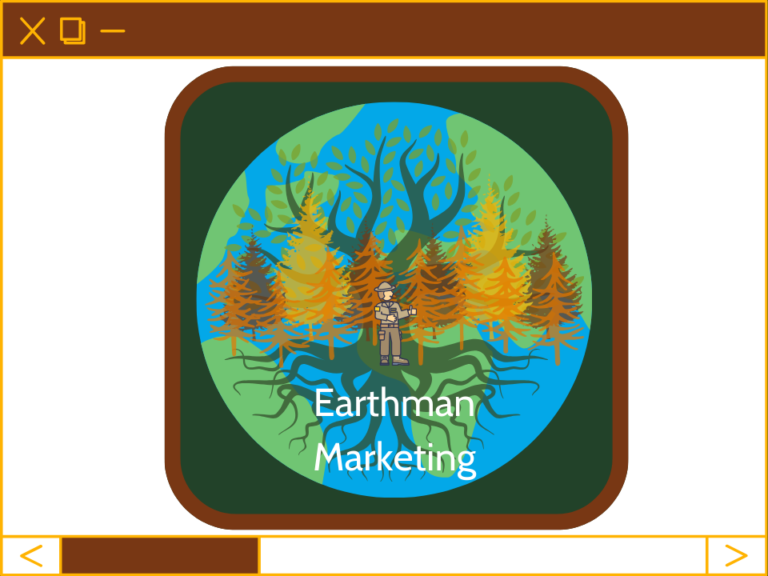No Digital Strategy? No Problem! Your Guide to Getting Started
September 22nd, 2025
Many small business owners feel overwhelmed by digital marketing. You might think you need a huge budget or a big agency, but that’s not always true. You can get started with smart, focused efforts and a little bit of help from Earthman Marketing.
Hiring a marketing agency can be helpful, but hiring a freelance digital marketing specialist can be even more beneficial for small businesses. Freelancers are often less expensive and also offer more flexibility. Plus, you often get faster results.
In this guide, we’ll cover key digital marketing essentials. You’ll learn what you need to begin your online journey.
In this guide, we explain:
What is SEO and Why Does Your Business Need It?
Have you ever wondered how businesses show up on search engine results pages (SERP’s), whether it’s on Google or Bing, or any of the search engines? Where a business shows up on a SERP has many factors that play into it, but it all starts with having an SEO optimized website. SEO stands for Search Engine Optimization, and it’s all about making your website more visible in search results.
Think of it this way: when someone searches for a product or service you offer, you want your business to appear, ideally at the top. SEO helps you do just that. Its primary goal is to help get your website to the top of SERPs with the help of a good plan and implementing some SEO tactics.
How to Do SEO
SEO might sound complex, but it can be broken down into key areas. Let’s take a look at Mozlow’s Hierarchy of SEO Needs. The needs at the top of the list are the bare essentials for obtaining SERP rankings, while the needs further towards the bottom are what you should focus on to maintain competition in your business field.
Mozlow’s Hierarchy of SEO Needs
- Crawl Accessibility: Can search engines find and read your website? Your website needs to be accessible to them. Tools like Google Search Console and Bing Webmaster Tools help with this. They show you how search engines see your site.
- Compelling Content: Does your content answer what people are searching for? High-quality content is king, and it should be helpful and relevant to your audience.
- Keyword Optimized: Can your content attract both searchers and search engines? Using the right keywords helps. These are the words and phrases people type into search engines, and you want to make sure your site is optimized for them.
- Great User Experience (UX): Is your website good-looking while being fast and easy to use? A good user experience is vital. This means fast loading times, easy navigation, and a captivating design.
- Your website must be responsive to mobile devices, as Google uses “mobile-first indexing”, meaning Google primarily uses the mobile version of the website for indexing and ranking.
- Share-worthy Content: Does your content earn you backlinks and citations? Great content gets shared, which helps amplify your business online and boost your Domain Authority. Simply put, backlinks are links from other websites to yours.
- Title, URL, & Description: Do your titles, URLs, and descriptions grab attention? These elements are the text fields that appear on SERPs, and they need to be compelling to get higher click-through rates (CTR).
- Snippet/Schema Markup: Do you stand out in search results? Schema markup helps. It provides extra information to search engines. This can create rich snippets that make your listing more noticeable.
Why Your Business Needs SEO
Investing in SEO offers many benefits for small businesses:
- Increased Online Visibility: SEO helps new and existing customers find your business online. The easier you are to find, the more people will discover you.
- Valuable Organic Traffic: People finding you through organic search are often looking for what you offer. This means they are highly engaged and more likely to convert into customers.
- Builds Trust and Credibility: Ranking high in search results builds trust and shows you are an authority in your field.
- Competitive Advantage: Your competitors are likely using SEO. If you don’t, you risk losing customers to them.
Why Local SEO Matters for Your Business
Local SEO is a specialized type of SEO. It’s pivotal for small businesses or businesses serving a specific geographic area. While regular SEO aims for broad visibility, local SEO focuses on location-based searches. Think “coffee shop near me” or “plumber in Santa Rosa.”
While there are some similarities between SEO and Local SEO, the latter takes a different approach to draw nearby customers to your business.
How is Local SEO Different from Regular SEO?
The goal of local SEO is still to show up in search results. However, it’s primarily for searches that are location-based. Small businesses, especially, need to focus on local SEO alongside regular SEO. It helps you connect with nearby customers.
What Does Local SEO Focus On?
Local SEO efforts concentrate on a few key areas:
Keyword Phrases
A main difference between regular and local SEO is in the targeted keyword phrases. Keyword phrases for Local SEO include a geographic location, like a city or county, or the phrase “near me”, as shown in the examples at the start of this section.
Optimized Business Profiles
Your Google Business Profile is essential, but don’t forget about creating an Apple Business Connect profile. Many businesses forget to create one because they assume most people primarily search with Google, and for the most part, they are right. However, neglecting to do so means your business is invisible to the millions of users who use Apple Maps. Make sure both are verified, fully optimized, and include accurate information and photos.
How This Impacts Voice Search
The number of users who use voice search, like Siri in Apple devices, continues to increase every single day. Not having an Apple Business Connect profile means that Siri is unable to find your business and recommend it to users.
Location Pages and Areas We Serve
If you have multiple locations or serve various parts of the county, dedicated pages for each targeted geography are important. These pages act as the target for those keyword phrases with geographies tied to them. For physical businesses with multiple locations and business profiles, each business profile’s website link should direct to its corresponding location page.
These location pages are typically grouped together in a section on the site labeled “Areas We Serve” and often placed in the footer menu. While Local SEO is largely based on your business’s location, including this section on the website tells Google and other search engines that your business serves that area. Even though you are not located there, this inclusion only increases your chances of coming up in the search results for those location-based keyword phrases.
NAP Consistency
NAP stands for Name (Full Business Name), Address (Physical location if applicable), and Phone Number (Business number). Not only should this information be highly visible on all high-traffic pages of your website, but it must be consistent across all platforms your business appears on. Aside from your website, this means your business profiles, social media accounts, Yelp, or any directory websites, all of it. These three pieces of information must be exactly the same, as Google sees that as a signal of trust.
Why Your Small Business Can’t Afford Not to Have a Website
To round all of this up, none of these digital marketing efforts can succeed, let alone even start, without a website. In today’s digital world, a website is not optional; it’s essential for businesses. Your website acts as your digital storefront, and it’s where potential customers learn about your business, products, and services.
Learning Curves for Busy Owners
Building a website can seem daunting. The intricacies of web development can be overwhelming, but also time-consuming, for busy business owners. Many choose to hire a professional, like me, to handle their website development and maintenance.
However, your website isn’t a “set it and forget it” kind of object. It requires ongoing management and updates. Not only does regular maintenance keep it secure, functional, and relevant, but it keeps it looking pretty and up to date.
The Importance From an SEO Perspective
It’s safe to say that much of the work that goes into SEO requires at least some amount of knowledge and insight into web development. Whether that ranges from uploading a blog to updating a photo on a page or building out a new page, the person performing those actions has some basic understanding of websites and web development. However, having someone who is well-versed in web development also doing your SEO and digital marketing is a utility your business should not pass on.
Get Found Online with Earthman Marketing: Your Dedicated Partner Awaits!
It greatly benefits businesses to have a single, dedicated person managing all these digital marketing aspects. Working with a freelance specialist is often cheaper than an agency, plus, there’s greater flexibility in time and pricing.
Small business owners, don’t wait to build your online presence. Get in touch with Earthman Marketing today! We can help you start your digital marketing strategy and get your business found online. Let’s work together to make your business grow!





